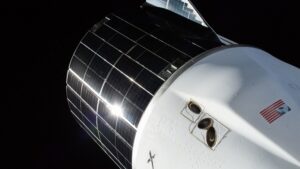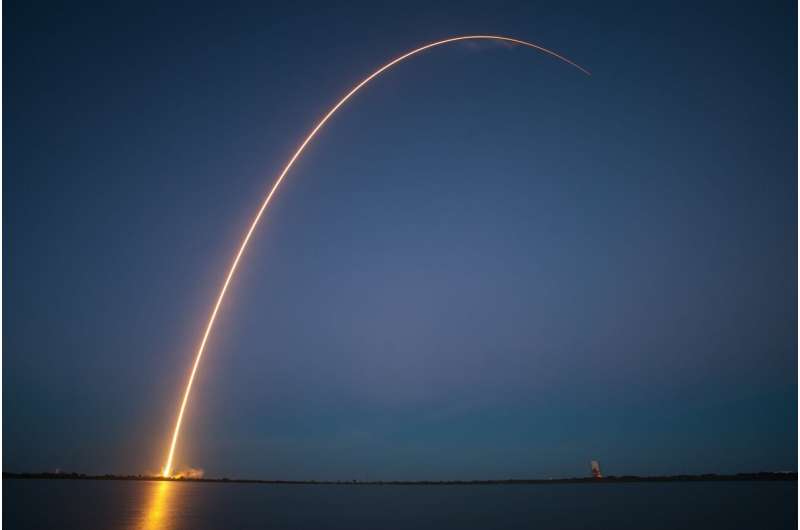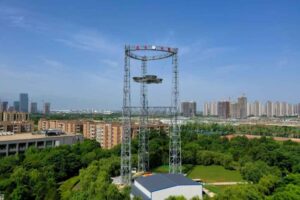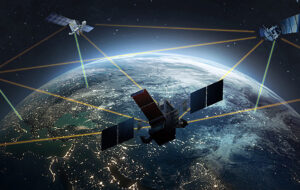Unravelling the mysteries of clouds
Tuesday, 14 June 2022 11:35 Clouds and aerosols are still considered the great unknowns in understanding our climate. With the EarthCARE Earth observation satellite, Airbus has made the finishing touches to the crucial 'key' that will unlock the mysteries of clouds, helping make more accurate atmospheric models and climate forecasts.
The 2.3-tonne satellite is now being transported from the Airbus site in Friedrichsh
Clouds and aerosols are still considered the great unknowns in understanding our climate. With the EarthCARE Earth observation satellite, Airbus has made the finishing touches to the crucial 'key' that will unlock the mysteries of clouds, helping make more accurate atmospheric models and climate forecasts.
The 2.3-tonne satellite is now being transported from the Airbus site in Friedrichsh Isar Aerospace and EXOTRAIL partner on cloud-based simulation software ExoOPSTM
Tuesday, 14 June 2022 11:35 The launch service provider Isar Aerospace signs in as the latest ExoOPSTM - Mission Design customer, Exotrail's Software-as-a-Service (SaaS) solution dedicated to space mission simulation and analysis.
Isar Aerospace, the leading European launch service provider focusing on small and medium satellite deployment, will use ExoOPSTM - Mission Design to answer the thriving demand for flexible
The launch service provider Isar Aerospace signs in as the latest ExoOPSTM - Mission Design customer, Exotrail's Software-as-a-Service (SaaS) solution dedicated to space mission simulation and analysis.
Isar Aerospace, the leading European launch service provider focusing on small and medium satellite deployment, will use ExoOPSTM - Mission Design to answer the thriving demand for flexible Studying grassland from space
Tuesday, 14 June 2022 11:35 The Sentinel-2 space mission began with the launch of Earth observation satellite Sentinel-2A in June 2015, and Sentinel-2B was launched in March 2017. Since then, these two satellites have been orbiting in space at an altitude of nearly 800 kilometres and, as part of ESA's Copernicus programme, providing data for, e.g., climate protection and land monitoring.
very three to five days, they
The Sentinel-2 space mission began with the launch of Earth observation satellite Sentinel-2A in June 2015, and Sentinel-2B was launched in March 2017. Since then, these two satellites have been orbiting in space at an altitude of nearly 800 kilometres and, as part of ESA's Copernicus programme, providing data for, e.g., climate protection and land monitoring.
very three to five days, they Earth's magnetic poles not about to flip
Tuesday, 14 June 2022 11:35 The emergence of a mysterious area in the South Atlantic where the geomagnetic field strength is decreasing rapidly, has led to speculation that Earth is heading towards a magnetic polarity reversal. However, a new study that pieces together evidence stretching back 9,000 years, suggests that the current changes aren't unique, and that a reversal may not be in the cards after all. The study is p
The emergence of a mysterious area in the South Atlantic where the geomagnetic field strength is decreasing rapidly, has led to speculation that Earth is heading towards a magnetic polarity reversal. However, a new study that pieces together evidence stretching back 9,000 years, suggests that the current changes aren't unique, and that a reversal may not be in the cards after all. The study is p New feedback system can improve efficiency of fusion reactions
Tuesday, 14 June 2022 11:35 Scientists at the U.S. Department of Energy's (DOE) Princeton Plasma Physics Laboratory (PPPL) have refined the use of magnetic fields to improve the performance of doughnut-shaped fusion facilities known as tokamaks. The improved technique protects internal parts from damage by instabilities called "edge-localized modes" (ELMs) and allows tokamaks to operate for longer without pausing.
"O
Scientists at the U.S. Department of Energy's (DOE) Princeton Plasma Physics Laboratory (PPPL) have refined the use of magnetic fields to improve the performance of doughnut-shaped fusion facilities known as tokamaks. The improved technique protects internal parts from damage by instabilities called "edge-localized modes" (ELMs) and allows tokamaks to operate for longer without pausing.
"O Difficult-to-observe effect confirms the existence of quark mass
Tuesday, 14 June 2022 11:35 A phenomenon that directly proves the existence of quark mass has been observed for the first time in extremely energetic collisions of lead nuclei. A team of physicists working on the ALICE detector at the Large Hadron Collider can boast this spectacular achievement - the observation of the dead cone effect.
The objects that make up our physical everyday life can have many different prope
A phenomenon that directly proves the existence of quark mass has been observed for the first time in extremely energetic collisions of lead nuclei. A team of physicists working on the ALICE detector at the Large Hadron Collider can boast this spectacular achievement - the observation of the dead cone effect.
The objects that make up our physical everyday life can have many different prope Cargo Dragon launch rescheduled for July after identifying hydrazine leak
Tuesday, 14 June 2022 10:18
A SpaceX cargo Dragon mission to the International Space Station will now launch no earlier than July 11, a delay of more than a month after engineers identified the source of elevated hydrazine readings in the spacecraft.
SpaceX closer to launching giant rocketship after FAA review
Tuesday, 14 June 2022 07:21
SpaceX cleared a key hurdle Monday for its plan to launch a gigantic, futuristic rocketship into orbit from Texas.
The Federal Aviation Administration concluded an environmental review of Elon Musk's Starship base. The agency saw no significant environmental concerns, but is requiring more than 75 actions to reduce impacts to the region.
It's no guarantee a launch license will be issued since other factors such as safety and financial responsibility requirements still must be met at the Boca Chica site, according to the FAA.
After the latest news, SpaceX tweeted: "One step closer to the first orbital flight test of Starship."
At nearly 400 feet (120 meters), Starship is the most powerful rocket ever built and meant to carry people to the moon and Mars. NASA intends to use it for the space agency's lunar landing of astronauts, planned no earlier than 2025.
While SpaceX has launched Starship's bullet-shaped upper stage several miles (10 kilometers) into the air over the past year—resulting in some spectacular explosions—it's yet to fly it atop a Super Heavy booster.
Some residents had opposed Starship launches and landings, citing not only the noise and closed roads, but also wreckage raining down from failed flights.
Chinese university completes space-based solar power ground test facility
Tuesday, 14 June 2022 07:14
China's Xidian University has completed what it calls the world’s first full-link and full-system ground test system for space-based solar power.
Space takes centre stage at VivaTech
Tuesday, 14 June 2022 07:12
How does ESA enable the European space industry to prosper in the global market? People attending this week’s VivaTech show in Paris – which will showcase how innovation and technology can build a more sustainable and inclusive society – will discover how.
BlueHalo wins $11 million Air Force contract for laser communications terminals
Tuesday, 14 June 2022 06:07
BlueHalo won an $11 million contract from AFRL to develop a pair of optical laser communications terminals and a ground station.
The post BlueHalo wins $11 million Air Force contract for laser communications terminals appeared first on SpaceNews.
Air Force scientist takes over as director of Space Force rapid procurement agency
Tuesday, 14 June 2022 05:11
Former AFRL directed energy director Kelly Hammett on June 6, 2022, took over as head of the Space Rapid Capabilities Office
The post Air Force scientist takes over as director of Space Force rapid procurement agency appeared first on SpaceNews.
Okapi:Orbits raises 5.5 million euros in seed funding round
Monday, 13 June 2022 22:57
Germany startup Okapi: Orbits raised 5.5 million euros ($5.7 million) in a seed funding round led by Munich Re Ventures with participation from Dolby Family Ventures, Herius Capital and APEX Ventures.
The post Okapi:Orbits raises 5.5 million euros in seed funding round appeared first on SpaceNews.
Okapi:Orbits raises $5.7 million in seed funding round
Monday, 13 June 2022 22:57
Germany startup Okapi: Orbits raised 5.5 million euros ($5.7 million) in a seed funding round led by Munich Re Ventures with participation from Dolby Family Ventures, Herius Capital and APEX Ventures.
The post Okapi:Orbits raises $5.7 million in seed funding round appeared first on SpaceNews.
Astra rocket fails to deliver 2 small satellites after launch, NASA says
Monday, 13 June 2022 22:53 NASA said a rocket carrying two small weather satellites failed Sunday, preventing the inauguration of a technology that would have helped better forecast hurricanes.
The rocket by California-based Astra lifted off from Florida's Cape Canaveral Space Force Station, but the rocket's second stage malfunctioned before reaching orbit and lost the shoebox-sized technology.
"After a nomina
NASA said a rocket carrying two small weather satellites failed Sunday, preventing the inauguration of a technology that would have helped better forecast hurricanes.
The rocket by California-based Astra lifted off from Florida's Cape Canaveral Space Force Station, but the rocket's second stage malfunctioned before reaching orbit and lost the shoebox-sized technology.
"After a nomina 
